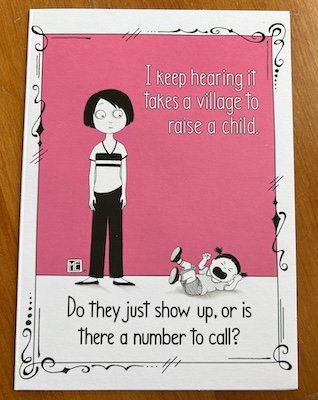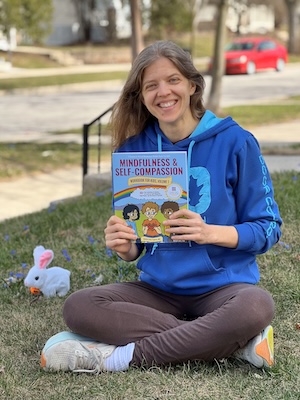And how self-compassion can help
Hello Friends,
Today I’m focusing on a common parenting challenge: Meltdowns. Whether a child is two or four, or sixteen, it can be extremely challenging to witness and stay calm when a child is melting down. And if we have a child that is neurodiverse or highly sensitive, the challenge can be even more acute.
It was my own daughter’s tantrums when she was 4 years old that brought me through the doorway of a therapist’s office and to self-compassion over a decade ago (I’ll share a blog on this soon).

This card says so much! Tantrums can feel like too much for a parent to bear alone.
If you have a child who is sensitive or neurodiverse…
You can read the article she wrote about our conversation regarding meltdowns here.

There’s so much goodness and common humanity in our conversation in the above article, and also in our interview below.
At around the 14:00 minute mark in the interview, I share my favorite self-compassion practice to use in the midst of a child’s meltdown and guide listeners through the practice of Breathing Compassion In and Out. Self-compassion can help both children and adults cope better and recover faster from a meltdown.
Back to the original question: Can we stop a child’s meltdown?
And what does it depend on?
-
It depends on the temperament of your child (and you).
-
It depends on how well-connected you and your child are to one another.
-
It depends on how well-slept and well-fed your child (and you) are.
-
It depends on how many other difficult things you and your child have already coped with that day (this can be huge). In other words, how resilient and well-regulated do you and your child feel before the challenge arises?
-
And it depends on how many resources you and your child have for coping with challenges (like mindfulness and self-compassion)!
There are more things I could add to this list, but these are a few of the elements that can affect how much or how little influence we will have over whether our child’s unhappiness will result in a full-on meltdown on any given day.
Resources to cope with shame—it’s not your fault!
If you have a child with big emotions and lots of meltdowns, IT IS NOT YOUR FAULT. And, self-compassion can help.
Next week I’m excited to share an interview between myself and Chris Germer regarding self-compassion, shame, and parenting. It is my favorite interview…ever. So powerful. I can’t wait to share it with you because you deserve to know you are a GOOD parent, and how self-compassion can help you show up as your best self for your child, again…and again…and again.
Wishing you light and love,
Jamie Lynn
P.S. Here’s a picture of my girls at an Easter egg hunt at grandma and grandpa’s house. Even though they are 12 and 16, they still had fun with their cousins looking for eggs!

P.P.S. And here’s a picture of me, my beloved workbook, and one of the girl’s Easter bunnies.

Thank you for being on this journey with me.
